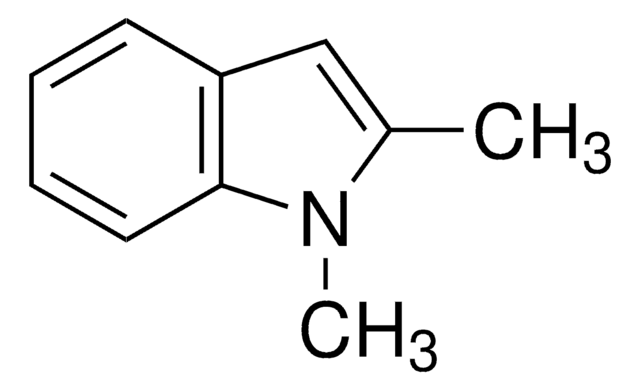All Photos(3)
About This Item
Empirical Formula (Hill Notation):
C9H9N
CAS Number:
Molecular Weight:
131.17
Beilstein:
111296
EC Number:
MDL number:
UNSPSC Code:
12352100
PubChem Substance ID:
NACRES:
NA.22
Recommended Products
Assay
98%
bp
265-266 °C (lit.)
mp
92-97 °C (lit.)
SMILES string
Cc1c[nH]c2ccccc12
InChI
1S/C9H9N/c1-7-6-10-9-5-3-2-4-8(7)9/h2-6,10H,1H3
InChI key
ZFRKQXVRDFCRJG-UHFFFAOYSA-N
Looking for similar products? Visit Product Comparison Guide
Hazard Statements
Precautionary Statements
Hazard Classifications
Aquatic Chronic 2
Storage Class Code
11 - Combustible Solids
WGK
WGK 2
Flash Point(F)
269.6 °F
Flash Point(C)
132 °C
Personal Protective Equipment
dust mask type N95 (US), Eyeshields, Gloves
Certificates of Analysis (COA)
Search for Certificates of Analysis (COA) by entering the products Lot/Batch Number. Lot and Batch Numbers can be found on a product’s label following the words ‘Lot’ or ‘Batch’.
Already Own This Product?
Find documentation for the products that you have recently purchased in the Document Library.
Customers Also Viewed
P K Mathur et al.
Meat science, 91(4), 414-422 (2012-03-23)
A system for sensory evaluation of boar taint was used to evaluate boar taint in fat samples from 6574 entire males. The term "human nose scoring" has been used to describe this system. The samples from each boar were heated
U Weiler et al.
Animal : an international journal of animal bioscience, 7(2), 300-308 (2012-10-04)
Feed intake behavior was studied between 9 weeks of age and slaughter in a total of 36 gilts, 32 immunocastrates, 33 surgically castrated barrows and 33 boars from 36 litters. Consequences for the concentration of substances contributing to off odor
Lisa Meier-Dinkel et al.
Meat science, 94(1), 19-26 (2013-01-30)
This study investigated the impact of assessors' varying olfactory acuity on the perceived intensity of androstenone and skatole odour and flavour in boar loins. To discriminate sensitive (SENS) and highly sensitive (SENSHIGH) panellists, two levels of androstenone were used on
K M Bekaert et al.
Meat science, 94(1), 125-132 (2013-02-14)
No automated detection system for boar taint detection is currently available, thus boar taint at the slaughterline can currently only be assessed using the singeing method (olfactory scoring). This study compares several heating methods (microwave, soldering iron and pyropen) and
Putative mechanisms of toxicity of 3-methylindole: from free radical to pneumotoxicosis.
T M Bray et al.
Annual review of pharmacology and toxicology, 34, 91-115 (1994-01-01)
Our team of scientists has experience in all areas of research including Life Science, Material Science, Chemical Synthesis, Chromatography, Analytical and many others.
Contact Technical Service








